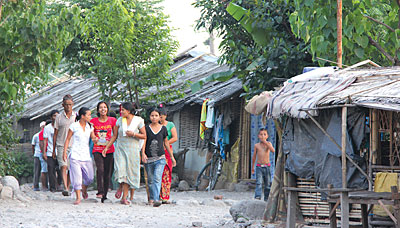 KRISHNA SINJALI |
It was business as usual when Bhutan's Prime Minister Jigme Y Thinley visited Nepal last week. Thinley's hosts, distracted by domestic political squabbles, expressed casual concerns and the guests gave half-hearted assurances prompting overly enthusiastic reporting in the mainstream media. But for thousands watching from rodent-infested refugee camps in eastern Nepal, it was just another sad week.
Two decades have passed since the Bhutan regime evicted 100,000 Lhotsampas, and Thinley's pre-departure press conference showed that his regime is still in denial about the massive violation of human rights of its citizens. Bhutan may now have a democratic fa�ade, but it doesn't mask the regime's callous disregard for international humanitarian standards when it calls one-sixth of its original population "environmental and economic refugees".
The two-time PM who now leads Bhutan's first "democratic government" not only refuted their identity but also refused to acknowledge the results of the verification process in 2003 conducted by the Joint Verification Team. Contributing to Bhutan's obduracy is the spineless diplomacy of successive Nepali governments, which have over the years done little more than offer platitudes.
Nepal has neither been consistent nor insistent that people living in the refugee camps are Bhutan's citizens holding the right to return and that the Bhutan government is obliged to comply under Article 13 of the UN Universal Declaration of Human Rights. UN aid was sought by Nepal merely to exempt itself from the economic burden of the refugees through third country repatriation.
The Bhutan refugee crisis is not just any other bilateral issue. These are people living in limbo, denied their basic right of citizenship. Nepal says they are Bhutanis while Bhutan says they possibly migrated from India. India says, well, it doesn't say anything at all. New Delhi was complicit in the transfer of refugees from Bhutan to Nepal and has refused to be involved in resolving the misery of people disowned by Bhutan even though it seems to be up to its nose in our domestic nonsense. India is a part of the problem because it has propped a regime responsible for the worst ethnic cleansing exercise in recent world history in terms of proportion of population, and it must be a part of the solution as well.
After years of struggle for justice, refugee leaders like the former Amnesty International prisoner of conscience Tek Nath Rizal are thoroughly disappointed with the attitude of the Nepal government. "They tell us in our face that we are least of their concerns now," Rizal says, "what else can we do?"
Editor of Bhutan News Service, T P Mishra says, "India, being the world's largest democracy, has unfortunately been supportive of the absolutist regime in Bhutan. So, there is no way for India to absolve itself from the present impasse." Mishra says New Delhi must first press Bhutan to be sincere in resolving the crisis but if it insists it has no role in facilitating repatriation, it should certainly not interfere in the process either.
The world has turned its back on the Bhutan's refugees, and so has the global media. Bhutan is neither Libya nor Afghanistan, where oil and geostrategic interests collide. But for a country that boasts of the gross national happiness of its citizens, the plight of the refugees will continue to be a blot on its 'democracy' unless it recognises the right to return of those who have opted for third-country resettlement.
The Nepal government has an abiding obligation to pursue this cause with the Bhutan regime, while India will do some good to its credibility if it does not persist in excusing its puppets in Thimpu, and ignore a potential future flashpoint in its northeast.
See also:
Debimaya's daughter, GOPAL GARTAULA in JHAPA
Gross national misery, CK LAL



